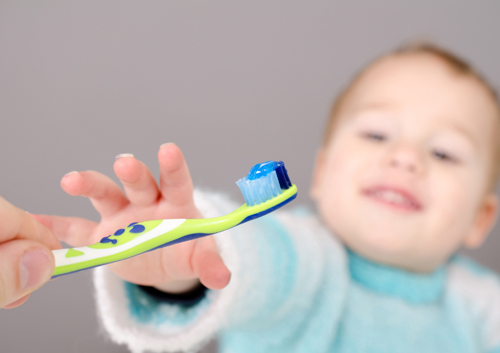What should I use to clean my baby’s teeth?
July 19th, 2016

You might think babies don’t need to brush their teeth, especially when they don’t have any. But by starting good habits like brushing when your child is young, you can lay the foundation for them to continue those good habits into adulthood.
When do I start?
The best time to start brushing your baby’s teeth is before he or she has any. Develop the habit of wiping your baby’s gums with a wet, soft washcloth or gauze every day. There is no need to use toothpaste, just wrap the gauze or cloth around your finger, moisten it with a little water, and gently rub it over the gums.
This helps your little one get used to brushing while it eliminates bacteria in the mouth that can harm emerging teeth. You don’t need to apply a lot of pressure or even take very long: just a quick, gentle rub over the gums will do it.
What do I use?
When your child’s teeth begin to come in, you will need to switch from a cloth to a baby toothbrush. Find one that has a grip big enough for your hand, but a head that is small enough to maneuver easily in your infant’s mouth.
You don’t need to use any toothpaste until your son or daughter is about a year old. Even then, though, you’ll want to use just a tiny amount: about the size of a grain of rice. When your toddler is about two years old, you can use a pea-sized amount.
By around six years of age, your child will probably rinse and spit without your help. At that point, you may want to introduce a child-friendly fluoride mouthwash.
How do I do it?
Your child probably won’t be able to brush his or her teeth alone until about the age of five or six. This means that you will need to do it. To brush your child’s teeth, gently use the brush over all the teeth and gums, even areas where the teeth have not come in yet.
As your child grows and becomes more independent, you can allow him or her to hold the toothbrush while you guide your child’s progress. Make sure you talk to your child while you are brushing, and explain why you brush: what you are doing and how you are doing it.
In addition to regular visits with Dr. Angela Paros, Dr. Anthony Reganato and Dr. Matthew Hamedani, instilling good oral health habits in your child early on will ensure a lifetime of good dental health.
Do adults need fluoride treatments?
July 12th, 2016

Many dentists and hygienists recommend fluoride treatments for their adult patients. You might ask yourself, “Do I really need a fluoride treatment? I thought those were just for my kids.” After all, most insurance plans cover fluoride treatments only up to the age of 18.
What you need to know as a dental consumer is that studies have shown topical fluoride applications performed by a dental professional create a significant benefit for adults who have moderate to high risk for cavities.
There are several circumstances that warrant extra fluoride protection among adults. Many prescription medications reduce saliva flow or otherwise create dry mouth. A reduction in saliva increases cavity risk.
Adults often experience gum recession, which exposes part of the root surface of teeth. These areas are softer than the hard enamel at the top of the tooth, which makes them more susceptible to decay.
In addition, adults often get restorative work such as crowns or bridges. Fluoride can help protect the margins of these restorations, ultimately protecting your investment.
Today many people opt for orthodontic treatment (braces) as adults. Braces make it more challenging for patients to maintain good oral hygiene. Just ask your kids! Fluoride can keep the teeth strong and cavity-free even with the obstacle of orthodontic appliances.
Have you had a restoration done within the last year due to new decay? If you have, that puts you at a higher risk for cavities. Fluoride treatments are a great way to prevent more cavities in patients who are already prone to them.
How is that flossing coming along? You know you should floss daily, but do you? If your oral hygiene is not ideal, fluoride could be just the thing to keep your neglect from leading to cavities between your teeth.
Fluoride can also help with the growing problem of sensitive teeth. Diets high in acidic foods and beverages, general gum recession, and increased use of whitening products all tend to produce sensitive teeth. Fluoride treatments re-mineralize tooth enamel and reduce that sensitivity.
Patients who undergo radiation treatment for cancer also benefit from topical fluoride applications. Radiation damages saliva glands, thus greatly reducing the flow of saliva. Saliva acts as a buffer against the foods we eat and beverages we drink. Once again, less saliva greatly increases the risk of cavities.
If one or more of these conditions applies to you, consider requesting a topical fluoride treatment. Be sure to ask Dr. Angela Paros, Dr. Anthony Reganato and Dr. Matthew Hamedani at your next appointment whether you might benefit from a topical fluoride application.
Don’t let a dental emergency ruin your summer vacation!
July 5th, 2016

For many of our patients at High Point Dental Group, summer means a season of relaxation, vacation, and outdoor fun and activities. While you can’t take a vacation from dental emergencies, you can always be prepared for anything that can happen. Today, Dr. Angela Paros, Dr. Anthony Reganato and Dr. Matthew Hamedani and our team thought we would give our patients a few tips on handling a dental emergency when you’re far from home (and our office).
Throbbing Toothache – Try brushing and flossing to ease the pain; the issue could be simply that a piece of food is nestled in an uncomfortable spot between your teeth. If that is the case, try to gently remove the object with dental floss. If it still hurts, stick to soft foods, try an over-the-counter pain reliever, or dip a cotton ball in clove oil and insert it on the affected area until you can get to a local dentist.
Bitten Lip or Tongue – Clean the area gently with a cloth and apply cold compresses to reduce swelling. If the bleeding doesn’t stop, go to a hospital emergency room immediately.
Lost Filling or Crown – Dental wax will work to keep the sharp edges of your tooth from bothering you. If you can, save the crown or filling, and if you happen to have denture adhesive handy, you can use it to temporarily reattach the crown until you can get to a local dentist.
Broken Tooth – Hold the tooth by the crown and rinse off the root of the tooth in water if it’s dirty. If possible, gently insert and hold the tooth in its socket. If that isn’t possible, put the tooth in a cup of milk and get to a local dentist as quickly as possible.
Broken Jaw – Apply cold compresses to control swelling. Visit a hospital emergency room as soon as possible.
If you have a dental emergency after regular office hours and you happen to be in town, please give us a call. If you are calling us after hours, please follow the emergency prompts to contact Dr. Angela Paros, Dr. Anthony Reganato and Dr. Matthew Hamedani.
Happy Fourth of July
June 28th, 2016

Every year, Americans all over the world celebrate the birth of the country and its independence on the Fourth of July. There are countless ways that people celebrate and they range from community parades and large scale gatherings to concerts, fireworks displays, and smaller scale celebrations among family and friends. For some people, July 4th is synonymous with baseball, while for others it is all about the beach of barbecues. However you celebrate, you can be sure that red, white, and blue is visible everywhere throughout the area.
The Beginnings of Fourth of July Celebrations
Although it wasn't officially designated as a federal holiday until 1941, the actual tradition of celebrating Independence Day goes back to the time of the American Revolution (1775 – 1783). At the time of the American Revolution, representatives from the 13 colonies penned the resolution that ultimately declared their independence from Great Britain. The continental congress voted to adopt the Declaration of Independence on July 2nd of 1776. Two days later, Thomas Jefferson's famous document that is now known as the Declaration of Independence, was adopted by delegates representing the 13 colonies.
First States to Recognize the Fourth of July
In 1781, Massachusetts became the first state (or commonwealth) whose legislature resolved to designate July 4th as the date on which to celebrate the country's independence. Two years later, Boston became the first city to make an official designation to honor the country's birth with a holiday on July 4th. In that same year, North Carolina's governor, Alexander Martin, became the first governor to issue an official state order stipulating that July 4th was the day on which North Carolinians would celebrate the country's independence.
Fun Facts About the Fourth of July
- The reason the stars on the original flag were arranged in a circle is because it was believed that would indicate that all of the colonies were equal.
- Americans eat over 150 million hot dogs on July 4th.
- Imports of fireworks each year totals over $211 million.
- The first “official” Fourth of July party took place at the White House in 1801.
- Benjamin Franklin didn't want the national bird to be the bald eagle. He believed that the turkey was better suited to the coveted distinction. John Adams and Thomas Jefferson disagreed with him, and he was outvoted, so the bald eagle became the official bird of the United States.
For many, the tradition is something entirely different. Along the coastal areas of the United States, people may haul out huge pots to have lobster or other types of seafood boils. Others may spend the day in the bleachers at a baseball game, or at a park, cooking a great traditional meal over an open fire. No matter how or where you celebrate, one thing is certain: all Americans celebrate July 4th as the birth and independence of our country.
Dr. Angela Paros, Dr. Anthony Reganato and Dr. Matthew Hamedani and our team at High Point Dental Group wish you a safe and happy Fourth of July!






